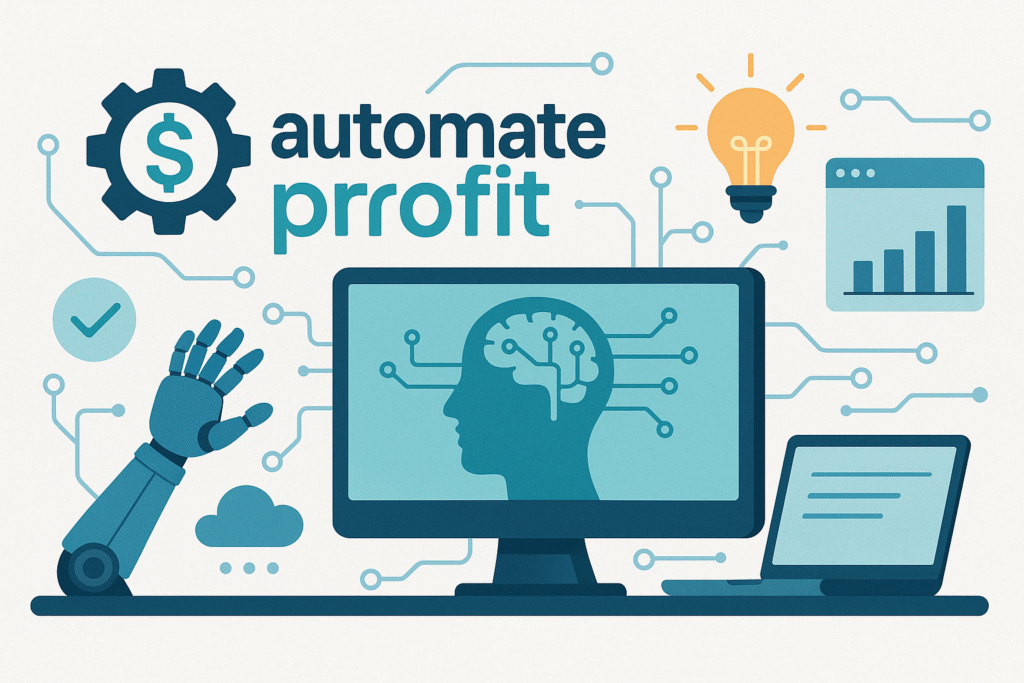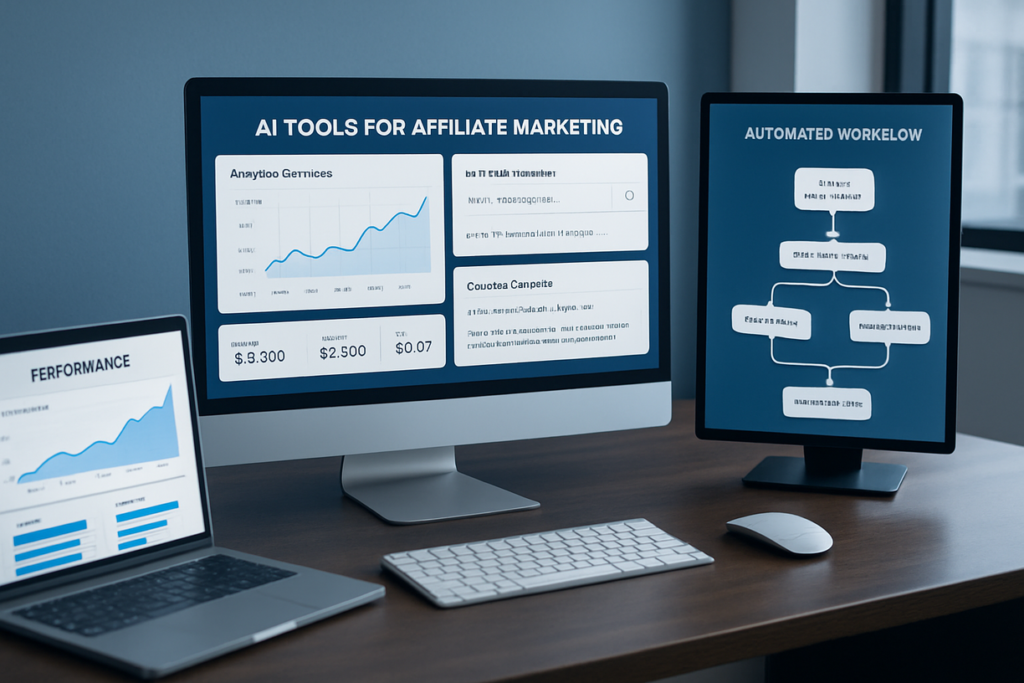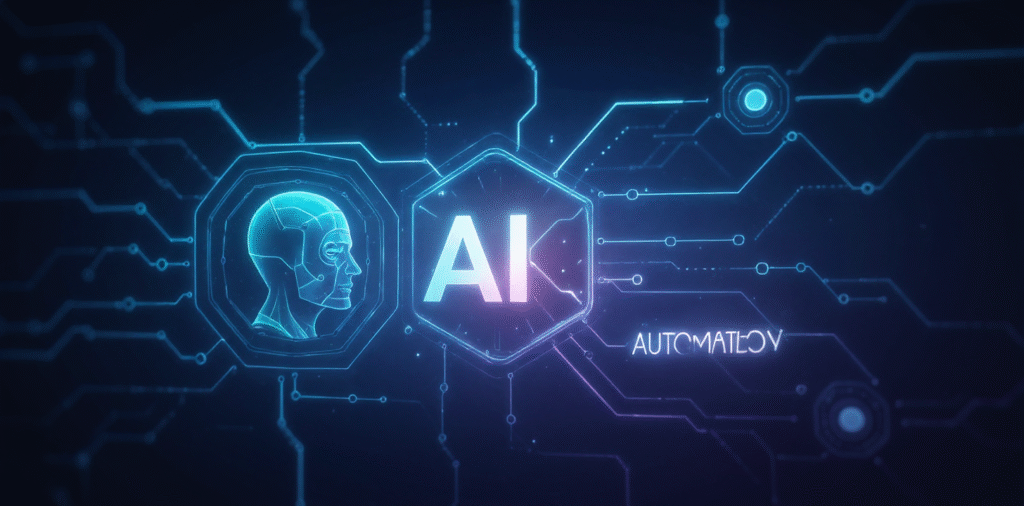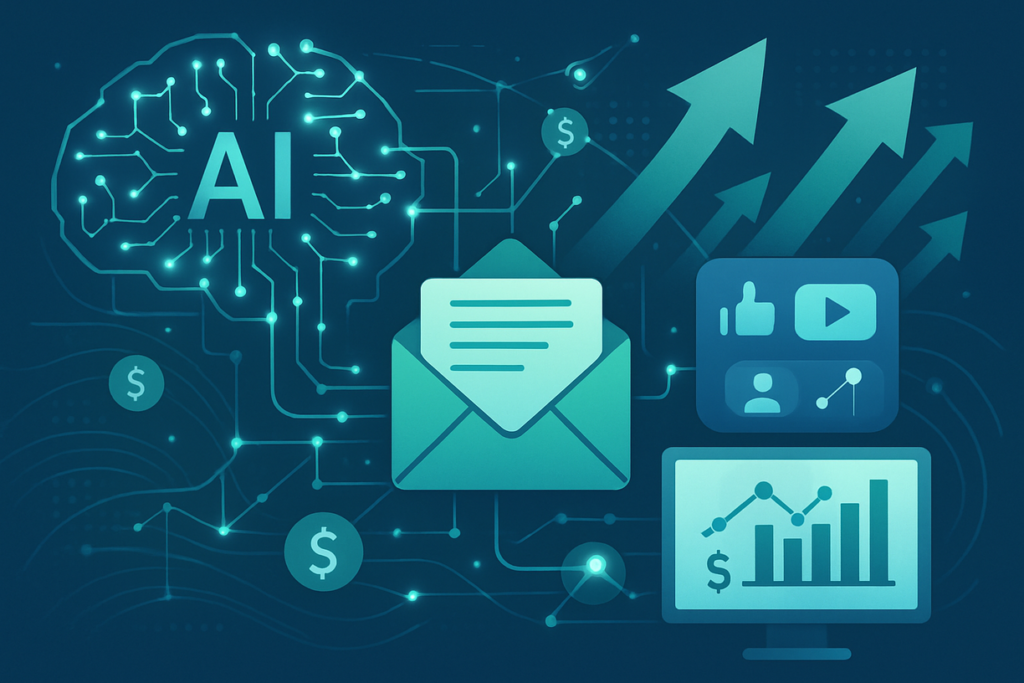
*Published by Mithun Srivastava | AutomateToProfit.com*
The affiliate marketing landscape has undergone a dramatic transformation over the past few years, and 2025 promises to be the year when artificial intelligence and automation truly revolutionize how we approach this lucrative industry. As someone who has been navigating the digital marketing space for years, I’ve witnessed firsthand how these technologies are not just changing the game—they’re completely rewriting the rules.
When I first started in affiliate marketing, success meant spending countless hours manually researching products, crafting individual emails, and constantly monitoring campaign performance. Today, the most successful affiliate marketers are those who have learned to harness the power of AI and automation to scale their operations while maintaining the personal touch that converts browsers into buyers.
The statistics speak for themselves. According to recent industry reports, affiliate marketers using AI-powered tools are seeing conversion rates increase by up to 40% while reducing their time investment by more than half. But here’s the thing that most people don’t realize—it’s not just about the tools themselves. It’s about understanding how to integrate these technologies into a cohesive strategy that amplifies your human insights rather than replacing them.
The Current State of Affiliate Marketing: Why Traditional Methods Are Falling Behind
Let me paint you a picture of what affiliate marketing looked like just five years ago. Marketers would spend their mornings scouring through dozens of affiliate networks, manually comparing commission rates and conversion data. They’d craft individual product reviews based on limited research, often relying on manufacturer specifications and a handful of customer reviews. Email campaigns were built using basic templates, sent to entire lists without segmentation, and success was measured primarily by open rates and click-through rates.
This approach worked when competition was lighter and consumers were less sophisticated. But today’s digital landscape demands something entirely different. Modern consumers are bombarded with marketing messages from every direction. They’ve developed an almost supernatural ability to detect generic, mass-produced content. They expect personalized experiences, detailed insights, and authentic recommendations that speak directly to their specific needs and pain points.
The affiliate marketers who are still relying on these traditional methods are finding themselves increasingly marginalized. Their conversion rates are dropping, their audience engagement is declining, and their revenue streams are becoming less predictable. Meanwhile, those who have embraced AI and automation are experiencing unprecedented growth and scalability.
What’s particularly fascinating is how AI has democratized access to sophisticated marketing techniques that were once available only to large corporations with massive budgets. Small-scale affiliate marketers can now leverage the same advanced analytics, personalization algorithms, and automated optimization strategies that Fortune 500 companies use to drive their marketing efforts.
Understanding the AI Advantage: More Than Just Efficiency

When most people think about AI in marketing, they immediately jump to efficiency gains. And yes, automation can handle repetitive tasks faster than any human ever could. But the real power of AI in affiliate marketing goes far deeper than simple task automation. It’s about augmenting human intelligence and creativity in ways that were previously impossible.
Consider content creation, for instance. Traditional affiliate content creation involved researching a product, reading through specifications, maybe watching a few YouTube reviews, and then crafting an article based on that limited information. The process was time-consuming, and the results were often generic because everyone was working from the same basic sources.
AI-powered content creation tools have completely transformed this process. They can analyze thousands of customer reviews, social media mentions, forum discussions, and expert opinions in minutes. They can identify patterns in customer sentiment that human researchers might miss. They can spot emerging trends and concerns before they become widespread issues. Most importantly, they can help you understand not just what people are saying about a product, but why they’re saying it and what underlying needs or frustrations are driving their opinions.
But here’s where it gets really interesting. The best AI tools don’t just aggregate this information—they help you synthesize it in ways that create unique insights and perspectives. They can help you identify angles and approaches that your competitors haven’t considered. They can suggest content structures that are optimized for both search engines and human readers. They can even help you adapt your writing style to better resonate with specific audience segments.
This isn’t about replacing human creativity and insight. It’s about amplifying them. The most successful affiliate marketers I know use AI as a research assistant, a brainstorming partner, and a quality assurance tool. They still bring their own experiences, perspectives, and authentic voice to their content. But they’re able to do so from a position of much deeper knowledge and understanding than was ever possible before.
The Automation Revolution: Building Systems That Scale
While AI enhances our decision-making capabilities, automation handles the execution at scale. The combination of these two technologies creates something that’s greater than the sum of its parts—marketing systems that can operate with both intelligence and efficiency.
Let’s talk about email marketing, which remains one of the most effective channels for affiliate marketers. Traditional email marketing involved creating a series of messages, scheduling them to go out at predetermined intervals, and hoping for the best. More sophisticated marketers might segment their lists based on basic demographics or past purchase behavior.
Modern automated email systems powered by AI can do things that would have seemed like science fiction just a few years ago. They can analyze individual subscriber behavior patterns to determine the optimal send times for each person. They can dynamically adjust message content based on real-time engagement data. They can automatically test different subject lines, calls-to-action, and content structures to continuously optimize performance.
But the real magic happens when these systems start learning from your entire marketing ecosystem. An AI-powered automation platform can recognize when a subscriber has visited your website, what pages they looked at, how long they spent reading your content, and what actions they took or didn’t take. It can then use this information to automatically adjust their email sequence, ensuring that the next message they receive is perfectly tailored to their current position in the customer journey.
This level of personalization was once available only to companies with dedicated data science teams and million-dollar marketing budgets. Now, individual affiliate marketers can implement these same strategies using affordable SaaS tools that require no technical expertise to set up and maintain.

Social media automation has evolved in similar ways. Instead of simply scheduling posts at regular intervals, modern automation tools can analyze engagement patterns to determine when your audience is most active and receptive. They can automatically adjust posting frequency based on content performance. They can even generate content variations to test different approaches and automatically promote the versions that perform best.
Practical AI Tools That Are Changing the Game
The landscape of AI tools for affiliate marketers has exploded in recent years, but not all tools are created equal. Through extensive testing and real-world application, I’ve identified several categories of tools that consistently deliver measurable results for affiliate marketers.
Content creation and optimization tools have become incredibly sophisticated. Platforms like Jasper, Copy.ai, and Writesonic can generate high-quality product reviews, comparison articles, and promotional content that rivals human-written material. But the key is understanding how to use these tools effectively. The most successful affiliate marketers don’t just input a product name and expect magic to happen. They provide detailed prompts that include target audience information, key selling points, competitive differentiators, and specific angles they want to explore.
What’s particularly impressive about modern AI writing tools is their ability to maintain consistency across large volumes of content while still producing unique, engaging material. You can create dozens of product reviews that all maintain your brand voice and style while addressing the specific features and benefits that matter most to your audience.
SEO optimization tools powered by AI have revolutionized how affiliate marketers approach search engine visibility. Tools like Surfer SEO, MarketMuse, and Clearscope can analyze top-ranking pages for any keyword and provide detailed recommendations for content structure, keyword usage, and topical coverage. They can identify semantic keywords and related topics that human researchers might overlook, helping you create more comprehensive and authoritative content.
But perhaps most importantly, these tools can help you understand search intent in ways that traditional keyword research never could. They can analyze the types of content that are currently ranking well for your target keywords and help you understand what searchers are really looking for when they use those terms.
Analytics and performance tracking tools have become incredibly powerful. Platforms like Triple Whale, Northbeam, and Hyros can track customer journeys across multiple touchpoints and channels, giving you a complete picture of how your marketing efforts are contributing to conversions. This is particularly valuable for affiliate marketers who are promoting products across multiple platforms and channels.
These tools can help you understand which content pieces are most effective at driving conversions, which traffic sources provide the highest-value visitors, and which promotional strategies generate the best return on investment. More importantly, they can automatically adjust your campaigns based on this data, ensuring that your marketing spend is always directed toward the most profitable opportunities.
Building Your AI-Powered Affiliate Marketing System
Creating an effective AI-powered affiliate marketing system isn’t about adopting every new tool that comes to market. It’s about building an integrated ecosystem of technologies that work together to amplify your strengths and compensate for your limitations.
The foundation of any successful system is data collection and analysis. You need to understand your audience, your content performance, and your conversion patterns before you can effectively leverage AI to improve them. This means implementing proper tracking across all your marketing channels, setting up comprehensive analytics, and establishing clear metrics for success.
Once you have solid data foundations in place, you can begin implementing AI tools strategically. Start with areas where you’re currently spending the most time on repetitive tasks. For most affiliate marketers, this means content creation, email marketing, and social media management.
Content creation is often the best place to start because the impact is immediately visible and measurable. Begin by using AI tools to enhance your research process. Instead of spending hours manually researching products and competitors, use AI-powered tools to gather comprehensive information quickly. Then use AI writing assistants to help you structure and draft your content, but always add your own insights, experiences, and personality to make it truly valuable and authentic.

Email marketing automation should be your next priority because it offers some of the highest returns on investment. Start with basic automation sequences like welcome series and abandoned cart recovery, then gradually implement more sophisticated behavioral triggers and personalization features.
Social media automation can help you maintain consistent presence and engagement without consuming all your time. But be careful not to over-automate social media—authenticity and genuine engagement are still crucial for building trust and relationships with your audience.
As your system matures, you can begin implementing more advanced features like predictive analytics, dynamic content optimization, and cross-channel attribution modeling. These advanced capabilities can provide significant competitive advantages, but they require solid foundations to be effective.
The Human Element: Why Authenticity Still Matters
Despite all the technological advances, successful affiliate marketing still comes down to trust and authenticity. AI and automation can help you operate more efficiently and effectively, but they can’t replace the human insights and genuine recommendations that drive conversions.
The most successful affiliate marketers I know use AI to enhance their human capabilities, not replace them. They use AI tools to research products more thoroughly, understand their audience more deeply, and communicate more effectively. But they still bring their own experiences, opinions, and personality to their marketing efforts.
This is particularly important in an era when consumers are becoming increasingly skeptical of automated and artificial content. People can usually tell when they’re reading generic, AI-generated material, and they respond much better to content that feels authentic and personal.
The key is finding the right balance between efficiency and authenticity. Use AI to handle the research, data analysis, and routine tasks that don’t require human judgment. But make sure that your final content, your promotional strategies, and your customer interactions reflect your genuine insights and recommendations.
Looking Ahead: The Future of AI in Affiliate Marketing
As we move further into 2025 and beyond, the role of AI in affiliate marketing will continue to evolve and expand. We’re already seeing the emergence of AI-powered tools that can predict market trends, identify emerging product opportunities, and even negotiate commission rates automatically.
Voice search optimization is becoming increasingly important as more consumers use smart speakers and voice assistants to research products and make purchases. AI tools that can optimize content for voice search and create audio-friendly formats will become essential for affiliate marketers who want to stay competitive.
Personalization will become even more sophisticated, with AI systems that can create unique content variations for individual users based on their browsing history, purchase patterns, and engagement preferences. This level of personalization will require affiliate marketers to think beyond traditional segmentation and embrace truly individualized marketing approaches.
The integration of AI with emerging technologies like augmented reality and virtual reality will create new opportunities for product demonstration and customer engagement. Affiliate marketers who can leverage these technologies effectively will have significant advantages in promoting products that benefit from visual or experiential marketing.
Taking Action: Your Next Steps
The opportunity to leverage AI and automation in affiliate marketing has never been greater, but it requires a strategic approach and a willingness to invest time in learning and experimentation. The affiliate marketers who succeed in this new landscape will be those who embrace these technologies while maintaining their focus on providing genuine value to their audiences.
Start by auditing your current marketing processes and identifying areas where AI and automation could provide the biggest impact. Focus on one area at a time, implement solutions systematically, and measure results carefully. Remember that the goal isn’t to automate everything—it’s to use technology to amplify your human insights and capabilities.
The future of affiliate marketing belongs to those who can successfully blend technological efficiency with human authenticity. By embracing AI and automation while maintaining your focus on genuine value creation, you can build a sustainable, scalable affiliate marketing business that thrives in 2025 and beyond.
The transformation is already underway. The question isn’t whether AI and automation will change affiliate marketing—it’s whether you’ll be among the marketers who harness these technologies to build more successful, more profitable, and more sustainable businesses. The choice, and the opportunity, is yours.
